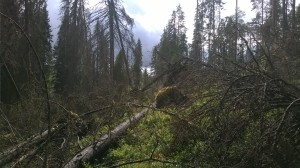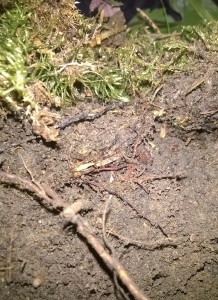 The project on the effects of abiotic and biotic disturbances on forest carbon balance combines research on soil ecology, carbon cycling, disturbances, and potential impacts of the climate change. Abiotic and biotic disturbance agents can affect carbon balance of forests, for example, via decreased photosynthetic capacity resulting from the increased tree mortality. However, these effects are not well known.
The project on the effects of abiotic and biotic disturbances on forest carbon balance combines research on soil ecology, carbon cycling, disturbances, and potential impacts of the climate change. Abiotic and biotic disturbance agents can affect carbon balance of forests, for example, via decreased photosynthetic capacity resulting from the increased tree mortality. However, these effects are not well known.
 The main aim of the project is to determine the effects of wind damage and outbreaks of the European spruce bark beetle (Ips typographus L.) on the carbon cycle in boreal forests. Intensity of damage and amount of necromass are related to climate and soil properties. Effects of insects on soil carbon balance are also compared between unmanaged and managed forests, and on areas that have been subjected to windthrows. Ecosystem carbon, nutrient, and water models, such as Biome-BGC, incorporated with different climate change scenarios are applied to simulate the effects of climate change on carbon dynamics. Modern modeling techniques combined with remote sensing and geographical information system (GIS) techniques are used to upscale the results to the regional level. The research will enhance our understanding of the uncertainties in assessing forest carbon sequestration in relation to insect damage and associated necromass production, leading to more accurate carbon accounting and assessment of climate change impacts.
The main aim of the project is to determine the effects of wind damage and outbreaks of the European spruce bark beetle (Ips typographus L.) on the carbon cycle in boreal forests. Intensity of damage and amount of necromass are related to climate and soil properties. Effects of insects on soil carbon balance are also compared between unmanaged and managed forests, and on areas that have been subjected to windthrows. Ecosystem carbon, nutrient, and water models, such as Biome-BGC, incorporated with different climate change scenarios are applied to simulate the effects of climate change on carbon dynamics. Modern modeling techniques combined with remote sensing and geographical information system (GIS) techniques are used to upscale the results to the regional level. The research will enhance our understanding of the uncertainties in assessing forest carbon sequestration in relation to insect damage and associated necromass production, leading to more accurate carbon accounting and assessment of climate change impacts.
